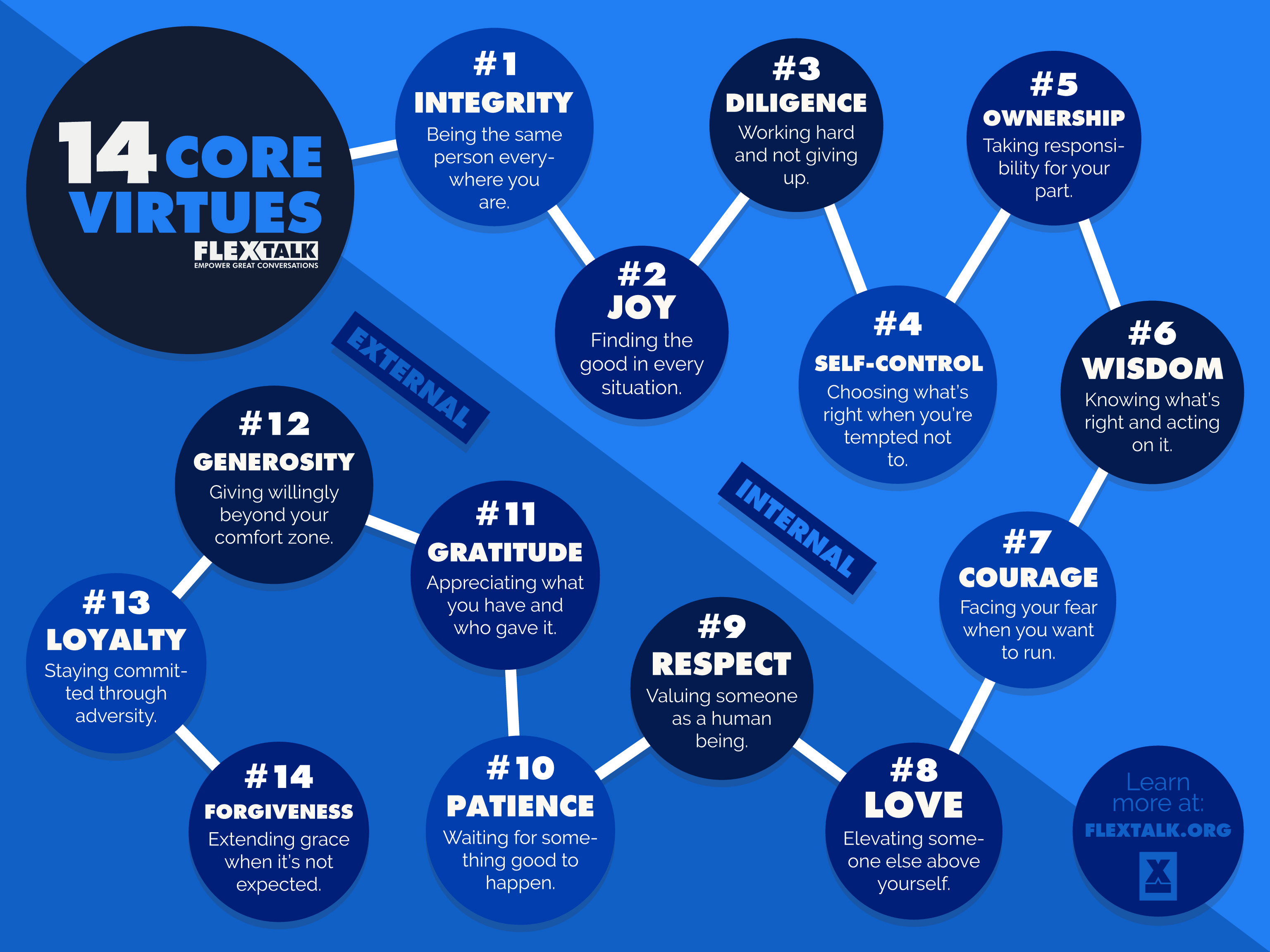How to Use FLEXTALK
New to FlexTalk conversations? Make the four FlexTalk commitments:
- Come ready to talk. Make a commitment to watch the video or listen to the audio before you meet for a conversation. This will prepare you to bring your own ideas and participate.
- Come ready to listen. Don't just share your perspective. If you find yourself lecturing or dominating the conversation, stop yourself and start listening more.
- Come ready to discover. Nobody has a corner on the truth. In good conversations you can expect to discover a fresh perspective on just about any topic.
- Come ready to change. The goal in every conversation is transformation, not just information. You're the only one who can act on something new you've discovered.
Teachers & Students
FlexTalk is perfect for every classroom. Just pick a topic below and watch the video in class. Then select a couple of students to take the lead, using the discussion questions to spark a conversation. Free. Easy. Good.
Q: Do students have to take the lead?
Of course not. But we believe students helping students is a better way forward.
Q: How often should we cover a topic in class?
We recommend once a week. We post new content every Monday to help keep the conversation fresh.
Q: How long should the conversation go?
Every conversation is a little different. Some topics take off and the conversation lasts for the whole period. Other topics never quite get off the ground, and that’s OK. Whether 10 minutes or 60 minutes, we recommend letting the conversation take shape however it needs to.
Downloads:
Featured Topics
Start talking about the topics below. Click here to log a meeting.
BROWSE MORE TOPICS
- How To Frame a Child’s Allowance as a Teaching Tool
- The 4 Types of Fake Friends
- Answer This Before You Start Dating
- Success
- Procrastination
- Anxiety
- Self-Control
- Dealing With Thoughts
- Don’t Be a Bully
- Integrity
- Take Ownership
- Your Habits
- Self-Esteem
- Resolving Conflict
- Empathy
- Speak Up
- Resilience
- Stay Curious
- Grit
- Confidence
- Body Image for Female Athletes
- Setting Goals
- Fear
- Patience
- Failure
- Focus
- Effort
- Embarrassment
- Disappointment
- Attitude
- Generosity
- Cheating
- Losing
- Forgiveness
- The Golden Rule
- Sharing
- Anger
- How To Have Courage
- Don’t Lie
- Use Your Words
- Be Respectful!
- What Does It Mean To Be Assertive?
- It’s Good To Share!
- Be A Good Friend
- Cooperation
- Don’t Be Jealous
- Listen up!
- What Is Obedience?
- Finding Good Friends
- Teachers Can Help!
- Why It’s Okay To Be Embarrassed
- Why You Should Talk Less
- Why It’s Important to Talk to Your Teachers
- Why You Should Accept Yourself
- Don’t Be Passive-Aggressive
- The Importance of Happiness
- Make a Decision and Make it Work
- Why Kindness Is the Best Revenge
- Why You Should Be Assertive
- It’s Okay to Act Like a Kid
- Don’t Be Late!
- You Can’t Change Others
- Don’t Dwell on Past Mistakes
- How You Should Act No Matter Who’s Watching
- The Power of Words
- You Gotta Take Care of Yourself
- Don’t Fall For Peer Pressure
- Make Your Family a Priority
- Make Your Sport A Priority
- Don’t Hate School, Make It A Priority
- Sit Down, Be Humble
- Recognizing Good Friends
- Honesty Is The Best Policy
- Practice Positivity
- How To Be Resilient
- Don’t Be Afraid To Dream Big
- Attitude Is Everything
- Practice Loyalty
- Show Your Appreciation (Series)
- Practice Forgiveness
- The Dangers of Overthinking
- Don’t Buy Into That Stupid Power Dynamic
- Living The Dream
- Don’t Conform, Be Your Own Person
- 2 Questions to Ask Before You Post Online
- Practice Gratitude
- Are Saturdays Really for the Boys?
- Know Your Identity
- Separating Yourself From the Crowd
- Dealing With the Haters
- Courage | Core Virtues for Kids #2
- Practice Patience
- Teens Talk About Bullying and Fitting In
- How to Talk to Your Parents About Your Depression
- Four Types of Friends in Junior High
- Ask a Pro Football Player
- Don’t Be A Follower
- How to Not Be a Gossip
- Dealing With Rejection
- Why Instagram Is Ruining Your Life
- The 5 Love Languages for Students
- The Pressures of Social Media
- Differences between Guy and Girl Friendships
- Learn How to Be Self-Confident
- How Addiction Happens
- Do’s and Don’ts of Dating in High School
- How to Deal With Insecurity
- What’s the Best Way to Communicate: Group Chat or Face to Face?
- Tips for Dealing With Bullies
- How to Help a Friend Who is Grieving
- How to Stop Procrastinating
- Friendships After High School Are Different
- Give Your Parents Another Chance
- Safe Web Surfing for Kids and Teens
- Four Ways to Deal with a Bully
- Tips from Your Internet Bodyguard
- The Difference Between Introverts and Extroverts
- Is High School Really the Best Years of Your Life?
- What Happens When You Have a Concussion?
- For Those Considering Suicide
- Patience | Core Virtues for Kids #1
- Don’t Compare Yourself to Others
- Study Less, Study Smart
- Sisters Before Misters
- Be Real
- How to Be Tall | Ask a Doctor
- How Social Networks Can Ruin Teens
- Self-Control for Kids
- 3 Ways Your Smartphone Is Ruining You
- What Every Kid Needs to Know About Attitude
- Good Homies vs. Toxic Homies
- The Truth About Popularity
- Make Time for Fun in High School
- Poop | Ask a Doctor
- How to Break Bad Habits
- STDs | Ask a Doctor
- Ask a Businessman
- What Every Kid Needs to Know About Drugs
- Compound Interest: Why Don’t They Teach This in School?
- How To Say “No!” to Almost Anything
- High School Advice From Graduating Seniors
- What My Dad Taught Me about Leadership
- Generosity for Teens | Core Virtues #12
- Patience | Core Virtues #10
- Love for Teens | Core Virtues #8
- How to Have Joy | Core Virtues #2
- How to Have Integrity | Core Virtues #1
- Gratitude for Teens | Core Virtues #11
- Respect | Core Virtues #9
- How to Be a Superhero 101
- How to Have Loyalty | Core Virtues #13
- How to Have Courage | Core Virtues #7
- How to Be Diligent | Core Virtues #5
- How to Take Ownership | Core Virtues #4
- How to Have Wisdom | Core Virtues #6
- How to Have Self-Control | Core Virtues #3
- How to Have Forgiveness | Core Virtues #14
- Should You Get Rid of Snapchat?
- Energy Bus for Kids
- What is Life Really Like in Rwanda?
- Recruiting: How Social Media Can Make or Break You
- How to Help a Friend Who Is Thinking About Suicide
- Five Things about Bullies
- Social Skills for Leaders
- Leading With Integrity
- Three Things Every Kid Needs to Know About Attitude
- Be Like Spieth
- Can online courses replace a campus education?
- The Grumble Family
- Investing for Teenagers
BROWSE ALL KEYWORDS
A
- Addiction - All (23)
- Addiction - Drugs/Alcohol (12)
- Addiction - Pornography (14)
- Addiction - Series (3)
B
- Budgeting - All (27)
- Budgeting - Series (1)
C
- Career (1)
- Character - Discipline (2)
- Character - Greed (3)
- Character - Habits (15)
- Character - Integrity (4)
- Character - Series (2)
E
- Emotional Intelligence (1)
- Emotions - All (34)
- Emotions - Confidence (3)
- Emotions - Depression (4)
- Emotions - Grief (3)
- Emotions - Identity (2)
- Emotions - Mental Health (29)
- Emotions - Series (4)
- Emotions - Suicide (4)
F
- fa (1)
- Family - Health (5)
- Family - Marriage (44)
- Family - Parenting Kids (37)
- Family - Parenting Teens (43)
- Family - Series (9)
- Food & Cooking (1)
H
- Health & Wellness (1)
- Home & Garden (2)
J
- Just for College (19)
- Just for Kids (19)
- Just for Men (14)
- Just for Men - Series (3)
- Just for Military (5)
- Just for Women (12)
- Just for Women - Series (3)
- Just for Young Adults (9)
R
- Relationships - Abuse (5)
- Relationships - All (35)
- Relationships - Boundaries (1)
- Relationships - Commitment (1)
- Relationships - Communication (34)
- Relationships - Conflict (5)
- Relationships - Dating (3)
- Relationships - Forgiveness (4)
- Relationships - Friendship (20)
- Relationships - Love (2)
- Relationships - Series (5)
- Relationships - Social Media (4)
- Relationships - Trust (1)
S
- Sports - Athletes (20)
- Sports - Coaches (15)
- Sports - Series (3)
- Students - Bullying (1)
- Students - High School (58)
- Students - Junior High (22)
- Students - Series (3)
- Sustainability (1)
T
- Training - Mentors (9)
- Training - Series (1)
W
- Workplace - Entrepreneurs (2)
- Workplace - Executives (3)
- Workplace - Leadership (53)
- Workplace - Mission & Vision (13)
- Workplace - People Skills (28)
- Workplace - Series (4)
- Workplace - Stress (3)
- Workplace - Success (27)
- Workplace - Teamwork (14)
- Workplace - Time Management (7)
- World - Culture (21)
- World - Economy (5)
- World - Poverty (2)
- World - Technology (6)

FLEXTALK Students
FlexTalk Students is an online video library where high school seniors teach 14 core virtues for a better life. We believe when older students talk about character, younger students actually listen! Click a tab below to get started.
Internal Virtues
Topic #1: Integrity
Talking Points:
- A person with integrity is the same person no matter what. They don't change who they are based on who they're around or where they're hanging out.
- No one likes to be friends with a hypocrite or a person they can't trust. This type of person has low integrity.
- The good news is you can grow in your integrity by honestly looking at your life and evaluating if you're always true to yourself, you can set goals to grow in areas where you lack integrity and you can surround yourself with people who have high integrity.
- What’s your initial reaction to this topic? What jumped out at you?
- What does it mean to you to be the same person everywhere you are? Give an example.
- Think of someone you know that doesn’t have very much integrity. Is it hard to get along with them? Why?
- What are some areas in your life where you could have more integrity? Set one or two “integrity goals”.
- Make a list of a few friends who have integrity. Make a separate list of friends or acquaintances who lack integrity. What will you do with those lists?
- Write a personal action step based on this topic.
Topic #2: Joy
Talking Points:
- Joy is being happy no matter what else is going on in your life. It's having a half glass full mentality where you can find the good in every situation.
- Joyful people are way more fun to be around and it helps you to stay calm when you're faced with challenges.
- Choose to have more joy in your life by identifying things you are thankful for and focusing on those things, surround yourself with joyful people and be a giving person to others.
- What’s your initial reaction to this topic? What jumped out at you?
- Who is the most joyful person you know? Why do you think they are that way? Were they born with this joy or did they choose to have it? Explain.
- Would most people consider you a joyful person? Explain?
- What’s the number one stressor in your life right now? Is this detracting from your joy? How can you eliminate it without messing up other parts of your life?
- What are some simple things you can start doing to incorporate more joy into your life? Explain.
- Write a personal action step based on this topic.
Topic #3: Self Control
Talking Points:
- Self control is choosing to do what's right even when you're tempted to do what you know is wrong.
- Self control will keep you out of trouble by helping you to avoid bad situations whether it's with drugs, porn or even your words.
- Practice self control by doing these things: take a timeout when you're mad or feeling really tempted and don't act on impulse. Zoom out and remember where you want to go in life and don't let an impulsive decision derail you. And, keep practicing so you can get better and better at it.
- What’s your initial reaction to this topic? What jumped out at you?
- Share a time that you reacted on an impulse and had no self-control? How did that situation turn out for you?
- How can self-control help you to not give in to your temptations?
- Have you considered what “triggers” you to engage in unhealthy behaviors? What are some of those triggers?
- How can you fight against some of the temptations that you have?
- What are some little battles you can win to prepare for some bigger ones?
- Write a personal action step based on this topic.
Topic #4: Ownership
Talking Points:
- Ownership is all about taking responsibility for your own actions. You can't blame others for your mistakes because only you can control what you do.
- It's not fun to be friends with people who make excuses for their bad behavior and always play the victim.
- You can grow in ownership by admitting the areas where you tend to make excuses, choose a balanced approach where you can see from other perspectives, not just your own. And commit to stop making excuses in one area of your life and then add more from there.
- What’s your initial reaction to this topic? What jumped out at you?
- What’s the worst excuse you’ve heard from someone who was trying to justify their actions?
- What does it mean to you to take ownership of something? Explain.
- Share an experience where you or someone you know failed to take responsibility for something. What was the outcome?
- What are some consequences that can come from not taking ownership in your life?
- What are some areas of your life where you can start taking ownership? Why do these areas stand out to you?
- Write a personal action step based on this topic.
Topic #5: Diligence
Talking Points:
- Diligence is working hard at something and not giving up. Learning to be diligent while you're young will help you when you're older looking for a good job.
- Diligence will teach you responsibility and will protect you from choosing the easy road of becoming a cheater.
- Learn to be diligent in your life by choosing not to procrastinate, setting smaller goals to get to the bigger goals and always looking to push your limits.
- What’s your initial reaction to this topic? What jumped out at you?
- Who is the most diligent person you know? What makes them so diligent?
- Share a time you lacked diligence and took the easy road. How did that affect your life?
- Share a time you choose to be diligent and worked hard for something. How did that affect your life?
- In what areas of your life do you struggle with setting goals and sticking to them? How could you improve on that?
- Write a personal action step based on this topic.
Topic #6: Wisdom
Talking Points:
- Wisdom is knowing what's right and choosing to act on that knowledge. It's one thing to know the right information but the real key is implementing it in your life.
- Wisdom helps you in life by keeping the little things in perspective and helping you to make good decisions on the big stuff.
- Choose to be W.I.S.E: Wait before making a big decision, Inspect all the options, Select the best option, Encode by learning from your experiences.
- What’s your initial reaction to this topic? What jumped out at you?
- Name your favorite fictional character who displays wisdom. In what specific ways do they show it?
- Name a real person in your life who displays wisdom. In what specific ways do they show it?
- When you think of a wise person, what are the attributes that come to mind?
- Think of a situation where you displayed wisdom. Explain.
- Think of a situation where you lacked wisdom. Explain.
- For your next big decision, how are you going to remember to be WISE?
- Write a personal action step based on this topic.
Topic #7: Courage
Talking Points:
- Courage is facing your fears when you want to run. When you're faced with peer pressure, courage can help you to stand up for your values to say "No".
- It takes courage to ask someone out on a date, to give a speech in front of your peers, or to try out for a sports team or the school play.
- Get more courage by identifying areas where you lack courage, push yourself out of your comfort zone and try new things, stand up for your beliefs and be true to yourself.
- What’s your initial reaction to this topic? What jumped out at you?
- Which movie, TV, or book character do you think is the most courageous? What’s the most courageous thing they’ve done?
- Name a real person in your life that is courageous. What do you think makes them that way?
- Describe the last time that you did something courageous. How did it feel?
- What are some things that cause you to fear? Why do those things scare you? How can you overcome those fears?
- What are some of your values? How can you stand up for your values even when others don’t agree?
- Write a personal action step based on this topic.
External Virtues
Topic #8: Love
Talking Points:
- Love is about elevating someone else's needs above your own. And, love isn't just for romantic relationships.
- Truly loving someone makes them feel important and that they have value. The opposite of love is being selfish and unkind.
- Grow in your ability to love by changing your mindset from being inward focused to outward focused, give freely with no expectation of getting something in return and learn about the five love languages.
- What’s your initial reaction to this topic? What jumped out at you?
- Who are some people in your life who are great at expressing their love for you? Why are they good at expressing it? How can you copy this and become more loving yourself?
- Would others consider you a loving person? Why or why not? Explain.
- Share about someone in your life who is selfish. How does their selfishness affect you? What can you learn from that?
- What’s your “love language” (how do you express love)? What’s your favorite form of love you like to receive? How will knowing these things affect you and your relationships with others?
- Write a personal action step based on this topic.
Topic #9: Respect
Talking Points:
- Respect is about valuing someone as a human being. That's what it means to show respect. But, having respect for someone goes one step further where you respect someone because they've earned your respect in some way.
- Being respectful will help you to get along with others whether it's a teacher, a peer or your parents.
- Show respect by listening to others and care about their point of view, be encouraging to others and tell them things you like about them and find ways to help and serve others.
- What’s your initial reaction to this topic? What jumped out at you?
- Think about someone you respect. What is it about them that makes them so respectable.
- Share a time when you felt like you did not get the respect you deserved. Explain.
- What is the difference between showing respect to someone versus having respect for someone?
- How do you want people to show you respect? What are some ways you can show respect to the people around you?
- Write a personal action step based on this topic.
Topic #10 Patience
Talking Points:
- Patience is endurance, often under difficult circumstances, and hopefully without complaining. In other words, waiting for something to happen without losing your mind!
- Teens have a lot of opportunities to have patience. It may be with an annoying friend, waiting for the acceptance letter to your college of choice, or working to earn a spot on the varsity team.
- Practice patience by remembering that when you're patient with others they will likely be more patient with you, practice gratitude and remember the good stuff you already have while you wait for something else and embrace the waiting time as it's a normal part of life.
- What’s your initial reaction to this topic? What jumped out at you?
- Describe a time when your patience was tested. How did that struggle affect you emotionally?
- How do you test the patience of others? How does it feel when you’re around an impatient person?
- What steps do you need to take to be more patient? How could patience help you to be a better person?
- Write a personal action step based on this topic.
Topic #11: Gratitude
Talking Points:
- Gratitude is about being thankful for what you have whether you think you've earned it or not.
- Gratitude promotes a positive outlook on life because you pay attention even to the little things you have like a house, food and clothes.
- Grow in gratitude by taking the time to look at all that you have, flip your attitude from seeing only the negative to focusing on the positive, and keep a gratitude journal that you can read on a bad day to cheer you up.
- What’s your initial reaction to this topic? What jumped out at you?
- Describe someone you know who has a lot of gratitude. What do you think of them? What do you think is their secret to having so much gratitude?
- What is the first thing you think of when you think about the word “gratitude?” Why?
- List three things you are thankful for today. How can you show gratitude for those things?
- In your own words, why does gratitude promote a positive outlook on life?
- Write a personal action step based on this topic.
Topic #12: Generosity
Talking Points:
- Generosity is giving beyond your comfort zone whether it's with your money or your time.
- Generous people make the world a better place because they are looking for ways to help others.
- Grow in generosity by identifying areas where you can give, work to get better at giving in those areas, and surround yourself with generous people.
- What’s your initial reaction to this topic? What jumped out at you?
- Who is the most generous person you know? How has their generosity affected you?
- Write down five pros of being a generous person. Why did you choose those things? How can you incorporate those into your life?
- Be honest, would people in your life consider you to be a generous person? Why or why not? If not, how much better could your relationships with those people be if you were more generous with them?
- Write a personal action step based on this topic.
Topic #13: Loyalty
Talking Points:
- Loyalty is about staying committed to someone, even through adversity.
- Loyalty is foundational to a true friendship. Disloyal people will ditch you at a moment's notice and will be dishonest with you.
- Grow in loyalty by identifying the friends in your life who are loyal to you, key in on the things they do to show their loyalty, and then implement those things in your own life.
- What’s your initial reaction to this topic? What jumped out at you?
- How do you define loyalty? What’s the first thing or person that comes to your mind when you think about loyalty?
- Take the person from the question above and list attributes that make them loyal. How many of these attributes do you see in yourself? Explain.
- Why does loyalty matter to you?
- Think of a time your loyalty has been tested. What happened and what was the result?
- Now think of a time that you’ve put too much loyalty in someone or something. What did you learn from this?
- How are you going to let the lessons from this lesson influence you in the upcoming weeks? Are there people that you will be more loyal to? Less loyal? Explain.
- Write a personal action step based on this topic.
Topic #14: Forgiveness
Talking Points:
- Forgiveness is extending grace even if it's not expected or deserved. It's about letting someone off the hook and not holding something over their head.
- Unforgiving people hold grudges and it's hard to be in a relationship with people like that.
- Grow in forgiveness by choosing to be respectful even when someone makes a mistake, be accepting that a friend might disappoint you from time to time, choose to be loving and understanding, and practice self-control in how you respond to someone.
- What’s your initial reaction to this topic? What jumped out at you?
- Share a time someone forgave you when you messed up? How did that affect your relationship?
- Share a time you struggled to forgive someone. Why was it so hard?
- Why is it hard to be friends with someone who holds grudges? Are you currently holding a grudge against someone and how could you work on forgiving them?
- How does being more accepting of people’s faults and being respectful help you to be a more forgiving person? When you mess up, how do you want people to respond to you?
- Write a personal action step based on this topic.
















